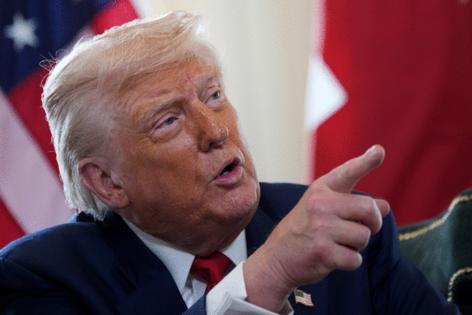Trump to Senate: Confirm more nominees before August recess
Published in Political News
WASHINGTON — With the House away, nominations and appropriations remain at the forefront of the Senate’s agenda for what is scheduled to be the final week before August recess.
Advancing President Donald Trump’s nominations is straightforward but laborious, with Democrats showing little willingness to expedite the process. That has led Trump and some GOP senators to call for slashing the regular August recess period.
“Very Important. Republicans must play to win. Clear the 135. So badly needed!” Trump posted on social media Saturday, in response to an earlier social media post from Sen. Mike Lee, R-Utah, saying the Senate should not leave for the August break without addressing 135 pending nominations (or actually recess and not hold pro forma sessions — potentially to try to allow recess appointments).
Trump spent the weekend in Scotland at his golf club, hitting the links while mixing in work, including announcing a deal on trade with the European Union.
Senate Judiciary Chairman Charles E. Grassley, R-Iowa, posted on X Sunday that he would support working on nominations in August if Trump called for it.
The Judiciary Committee has been getting Trump’s nominations in the queue for floor consideration, and Senate Majority Leader John Thune, R-S.D., has been scheduling them for floor votes at a steady clip. But there’s been little sign so far of any agreement with Democrats to advance the customary big batch of noncontroversial nominees ahead of the August recess.
The call to cancel the August recess is a familiar one when the party controlling the Senate is the same as the president’s. Thune has already set up cloture vote on numerous nominations for this week, including Susan Monarez to be director of the Centers for Disease Control and Prevention and Sam Brown to be undersecretary of Veterans Affairs for Memorial Affairs. Brown was the Republican nominee for a Senate seat in Nevada last year.
Epstein amendments possible
While the House was always scheduled to leave town last week, Republicans did so more abruptly than planned amid a bipartisan outcry over releasing documents related to the Jeffrey Epstein scandal. The scandal, especially the Justice Department’s handling of the Epstein records under Attorney General Pamela Bondi, could further complicate the appropriations process this week.
Senate leaders plan to take up an appropriations package made up of the Military Construction-VA, Agriculture and Commerce-Justice-Science bills. But the vehicle is the House-passed MilCon-VA measure, and it would likely require unanimous consent to add the other measures due to rules that limit amendments to appropriation bills. If the C-J-S bill makes the cut, it would be all but certain that Democrats would seek to force votes on germane amendments related to Epstein.
But that’s not all. The appropriations process is also complicated by the White House’s position regarding efforts to further rescind previously appropriated funds, including a potential effort to claw back Education Department funding.
“We are looking to do a rescissions package. We are always gauging the extent to which the Congress is willing to participate in that process, and we’ll be looking at a lot of different options along those lines,” White House Budget Director Russ Vought said Sunday on CBS’s “Face the Nation.”
Vought would not rule out further rescissions packages before the end of the current fiscal year, which ends in September. He has previously talked about the prospect of “pocket rescissions” that, if legally sound, could claw back funds too close to Sept. 30 for Congress to act.
“We certainly recognize that we have the ability and the executive tools to fund less than what Congress appropriated,” Vought said Sunday.
While Senate Democrats largely joined in a 91-7 vote to limit debate on proceeding to the Military Construction-VA bill, it was too early to tell if the prospect of further rescissions or amendment fights related to Epstein would trip up the process before it really gets underway.
In any event, Senate appropriators plan to mark up both the Defense and Labor-HHS-Education spending bills on Thursday morning. Those two measures are often paired together in the Senate, as the Defense bill is the top priority for Republicans and the Labor-HHS-Education bill is the top focus of Democrats.
But the two measures are a heavy lift, amounting to more than $1 trillion in discretionary spending. The Labor-HHS-Education bill is typically one of the most contentious spending measures, triggering partisan fights over abortion policy and other hot-button social issues.
_____
(David Lerman contributed to this report.)
©2025 CQ-Roll Call, Inc., All Rights Reserved. Visit cqrollcall.com. Distributed by Tribune Content Agency, LLC.

























































Comments